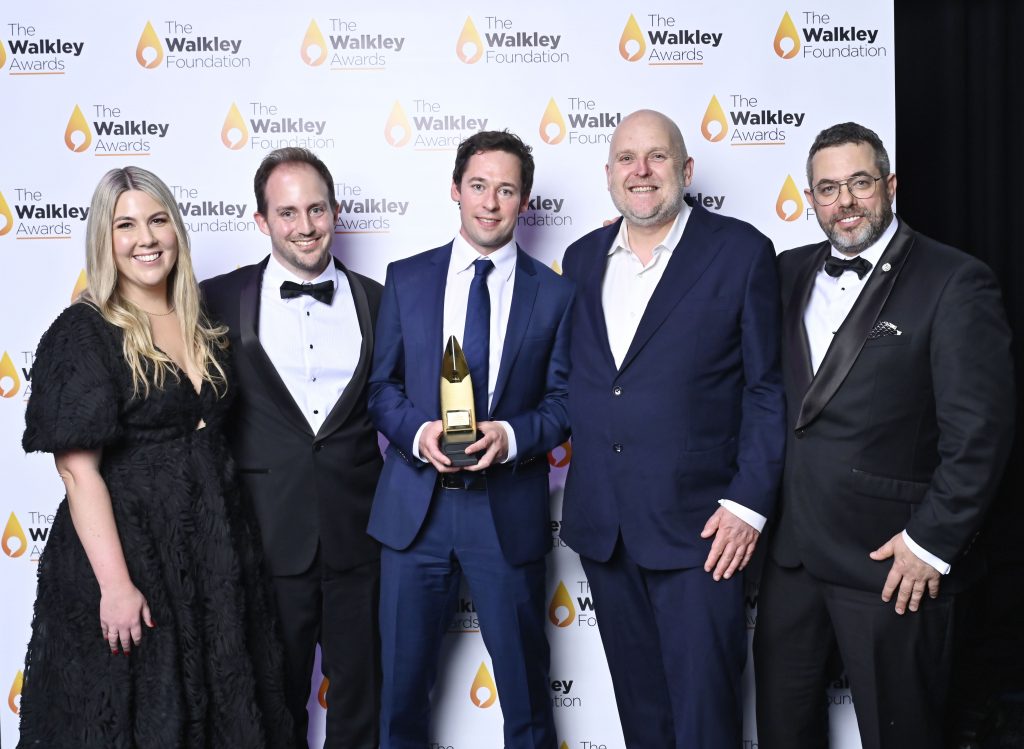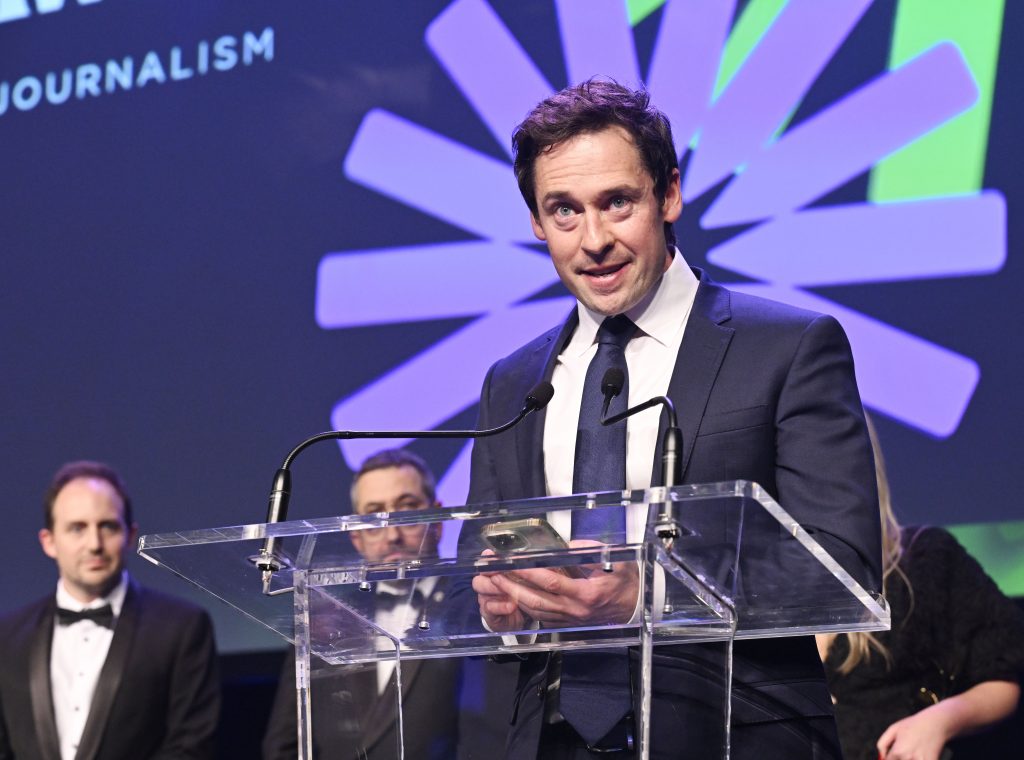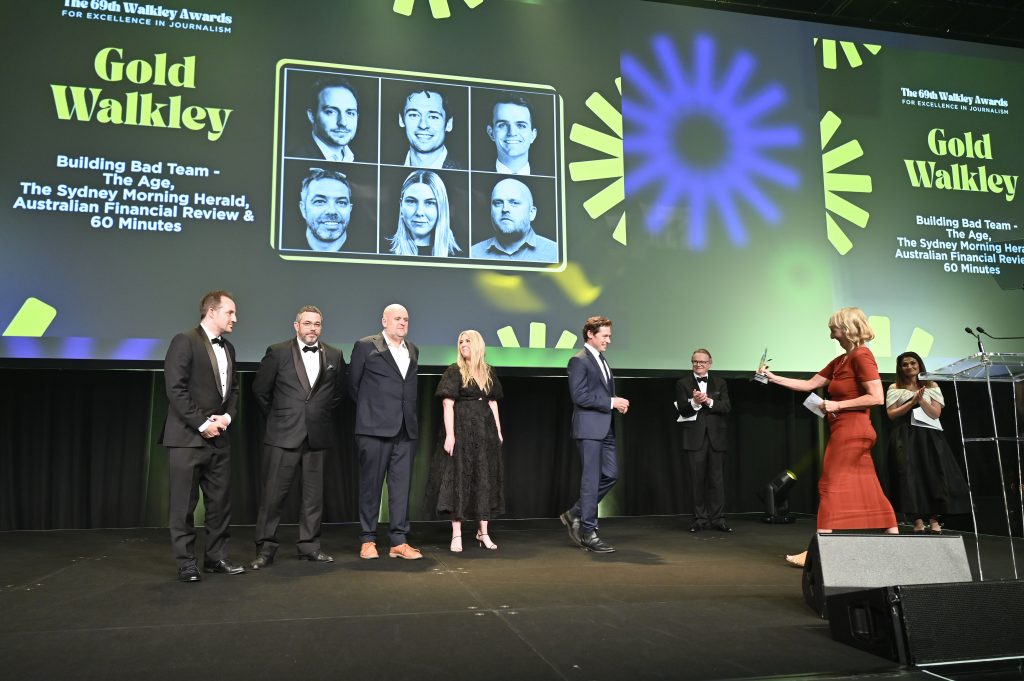Nick McKenzie led the cross-platform, collaborative team behind the 2024 Gold Walkley-winning investigation ‘Building Bad’.
The Building Bad Team is Nick McKenzie from The Age, The Sydney Morning Herald and 60 Minutes, David Marin-Guzman from The Australian Financial Review, Ben Schneiders from The Age, Garry McNab and Amelia Ballinger from 60 Minutes, and Reid Butler from Nine News.
Nick spoke with the Walkley Foundation to share some of the stories behind the story.

From left: Amelia Ballinger, David Marin-Guzman, Nick McKenzie, Ben Schneiders and Garry McNab with the Gold Walkley at the 69th Walkley Awards in Sydney on 19 November, 2024. Photo: Adam Hollingworth @ Hired Gun.
Jack Larkin (Walkley Foundation): How did this story originate? At what point did you think it was necessary to bring multiple media publications in?
Nick McKenzie: I started writing about perceived CMFEU corruption back in 2008 in some detail, and had always kept an eye on it, because it was clear from time to time that there were serious racketeering-type issues involving the union-building companies and organised crime. So [for me it] went back to 2008 and my colleague Ben Schneiders, a couple of years after that. From around 2010 or 12 I started doing a fair bit of reporting around the Union and also around John Setka problems, and issues.
David Marin-Guzman at the Financial Review over the last three years had done some excellent reporting. And it was really a matter of late 2023, me chatting with both David and Ben and saying, guys, let’s get our heads together. I picked up a whole bunch of fresh intelligence around corruption, organised crime issues, and the guys were also hearing bits and pieces, and we said, let’s see if we can pool our sources, our resources, our information, and build it into a story that will have more impact than if we just go our own ways.
One of the things we fell across was an issue involving the death of a young Indigenous building worker. And, as it happened, Reid Butler from the Channel Nine newsroom had a TV news reporter who had separately come across that same story and (the reporter) had formed a relationship of trust with the deceased man’s family. So then we said, can we bring you into the reporting picture? And then it was up to some very talented television people, Garry [McNab] and Amelia [Ballinger], to turn a lot of information that was okay for newspapers, but not good for TV, into television that could be consumed by a mainstream audience.
Jack: I watched the 60 Minutes story, and it was quite sad to hear about what happened to that kid. And it was very brave of the mum to speak up, because I imagine she would have been pretty scared.
Nick: There’s so much fear around the CMFEU and certain members of the union, and obviously lots of fear around bikers. The culture of intimidation has dominated the construction sector for so many years, and the trick was getting people to be brave enough to speak up and speak out. And it wasn’t just that family that was really brave, but there were building workers and Unionists themselves who spoke to us behind the scenes and then sometimes on camera, who were also extremely brave.
Jack: What were the advantages of having a large team? Was it easier to work on the story and break it?
Nick: We suddenly had four sets of sources rather than one, and it meant that we were an information-gathering machine for a period of time. It just amplified the journalism. Made it easier to dig up information and to cross-check information, and then, of course, in the delivery of that information and the storytelling, we could hit the Financial Review’s business audience. We had the mainstream audience of The Age, in the Sydney Morning Herald and then with 60 Minutes, a massive television audience. The program that we did on 60 Minutes, I think it reached well over a million people. So the story couldn’t be ignored, and I think there is a danger, if just one newspaper goes alone, it can be easy to look the other way.
Jack: Was there any point during the investigation where you felt like the story might collapse and not get to the air?
Nick: We knew we knew we had a good story, we just didn’t know how good. And then the danger wasn’t that the story would collapse. The danger was it wouldn’t have the impact that we hoped it would. I remember actually watching the program as it went to air, and reading articles over the weekend, I was really unsure what the response would be. But then suddenly, on Monday and then Tuesday, Wednesday, the week rolled on after we first broke the story. The response was really significant when John Setka resigned, you know, probably the most infamous and arguably influential unionist in the country. Now, when he resigned on the eve of the story, we knew we were onto something big. But then the government started to make some significant noises around what it might do to confront what we found. You know, seeing is believing. I think it was surprising for many people that Labor did what it did, because of the patronage and ties that involved Labor and the trade union movement. But I mean, ultimately, I think it really showed the ALP knew that the whole thing was rotten. They just needed the catalyst to act, and we were the catalyst.
Jack: I was quite surprised as well knowing how deep and ties are together. But, it was, it was good to see that, you know, someone finally uncovered what many people already knew.
Nick: You know, that’s a point. A lot of people did know what we dug up. But knowing it’s one thing. When it’s out there in the public domain in such a visceral way, that’s another thing. I think one of the tricks with the story was actually showing the bikies going about their business in the building industry, going about their business with the senior CMFEU members. Seeing is believing—that’s also the power of television. Effectively we could name names and identify the organised crime that was at work. When you put it out there in a blunt way, people go, hang on. This isn’t normal. This isn’t right. How is it that organised crime is in bed with one of the most powerful unions in the country and with building companies? This is wrong, but it took serving it up on a very visual, powerful platform to cut through.
Whistleblowers were a big focus at the 69th Walkley Awards, with a speech from Richard Boyle, who is facing a criminal trial for revealing the aggressive and punitive debt collection practices of the ATO, and a video from David McBride in jail, where he is serving a sentence of five years and eight months for leaking classified army documents which helped the ABC expose war crimes by Australian soldiers in Afghanistan. Also present were Troy Stolz, who was sued for leaking information on the failure of clubs in NSW to comply with money laundering and counter-terrorism laws, and Jeff Morris, who blew the whistle on misconduct in the Commonwealth Bank.
Jack: Are you worried that the government will continue cracking down on whistleblowers?
Nick: Unfortunately opposition politicians, when they’re in opposition, often talk a good game about helping whistleblowers and improving Freedom of Information laws and combating the problems with the defamation system in this country, but when they enter government, they suddenly, very rapidly lose their interests to encourage whistleblowing and to encourage scrutiny. Unfortunately, we’ve seen that Labor talked a very good game in opposition, and then really hasn’t delivered in government in terms of permanent whistleblower protections and a system that favours accountability over secrecy. It was really powerful to see the whistleblowers at the Walkley event. And you could really see the human cost. I mean, I spoke to Richard Boyle, to Troy Stolz and Jeff Morris after the event. They’re all carrying a significant burden because they’ve done the right thing. Of course, we know that David McBride is in jail. It feels like it’s a dark time to be a whistleblower in Australia at the moment.

Nick McKenzie speaks at the 69th Walkley Awards in Sydney on 19 November, 2024. Photo: Adam Hollingworth @ Hired Gun.
Jack: Did you or anyone from your team experience intimidation or fear retribution through the story?
Nick: It’s been one of the most difficult stories in my career in terms of the blowback from bikies and from people in the underworld. And from some of the union bosses who seem to want to act like gangsters rather than act like unionists. And I’ve copped intimidation and unpleasant behaviour from all three of those groups, and it’s really nasty. Bikies don’t muck around, their whole system relies on fear and intimidation. So we can’t be fearful, we can’t be intimidated, and we’re not. We have to keep reporting. But it is unpleasant, and it’s awful when you’re worried about your family as well.
Jack: I can imagine that would have been quite scary. Even one of the whistleblowers in the program, they were threatening him as well. It seems like that’s the way they go about, trying to terrify people.
Nick: The CMFEU over time, normalised the involvement of organised crime in the building industry, normalised that problems would be sorted out with a visit from a biker, and they saw the police, law enforcement, as the enemy. And after that, the union lost its way. When the CMFEU are suddenly acting like gangsters, something’s terribly, terribly amiss.
Jack: Were you satisfied with the government’s response to your story?
Nick: It’s a work in progress, the corruption needs to be rooted out. It needs to be put on the table, and the corrupt need to be dealt with, and that’s yet to happen. It is happening slowly, but there’s an old saying, when the corrupt are exposed the corrupt fight back, and that’s what’s happening at the moment. There is a rear-guard action from people to protect their power and their money and their earning ability, their rorts, and the administration is doing what it can to deal with that, but it’s a big fight not easily dealt with. It is very much a work in progress.
Jack: If you were starting from scratch, would you change anything throughout the course of this story?
Nick: Since we’ve done the story we have been inundated with a lot more information. We really exposed the tip of an iceberg, excuse the cliche. If anything, I would have gone harder. There’s a lot more corruption out there than what we exposed in the building industry. It’s our job to keep exposing it.
Jack: What advice would you give young journalists who want to get into investigative journalism?
Nick: Start doing it, every journalist is an investigative journalist, in whatever field they work. All journalists investigate. When you find something wrong, don’t let up, keep at it, keep digging up fresh leads and building your knowledge base, building a contact base. Don’t wait to become an investigative reporter. You are a domestic reporter. We are all investigative reporters. The trick is really navigating newsrooms which often have a demand for big, short turnarounds. You’ve got to work in that environment, but to see through an investigation sometimes takes weeks or months or even years. The biggest thing is to go and build it.
Jack: It was a big team that won the gold Walkley, any idea where is it going to live?
Nick: It is a big team! I think we’ll have to cut it into seven pieces or melt it down and forge them into rings!

Photo: Adam Hollingworth @ Hired Gun.
—–
Building Bad Team – The Age, SMH, AFR and 60 Minutes, Nine, ‘Building Bad‘
—
Interview by Jack Larkin, 2024 Walkley Indigenous Scholarship winner.


